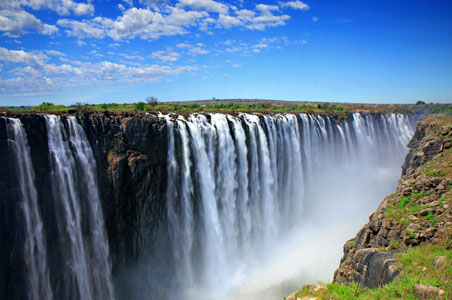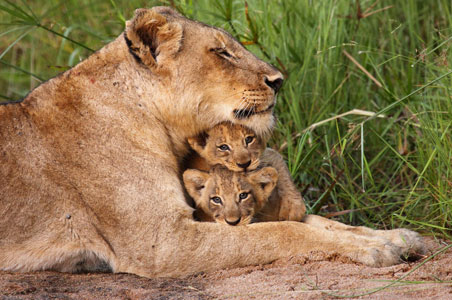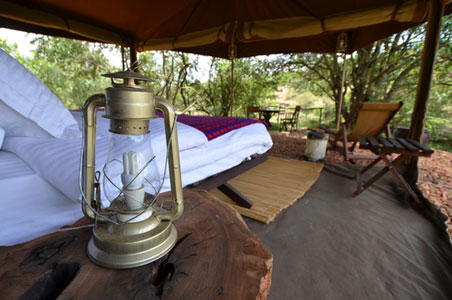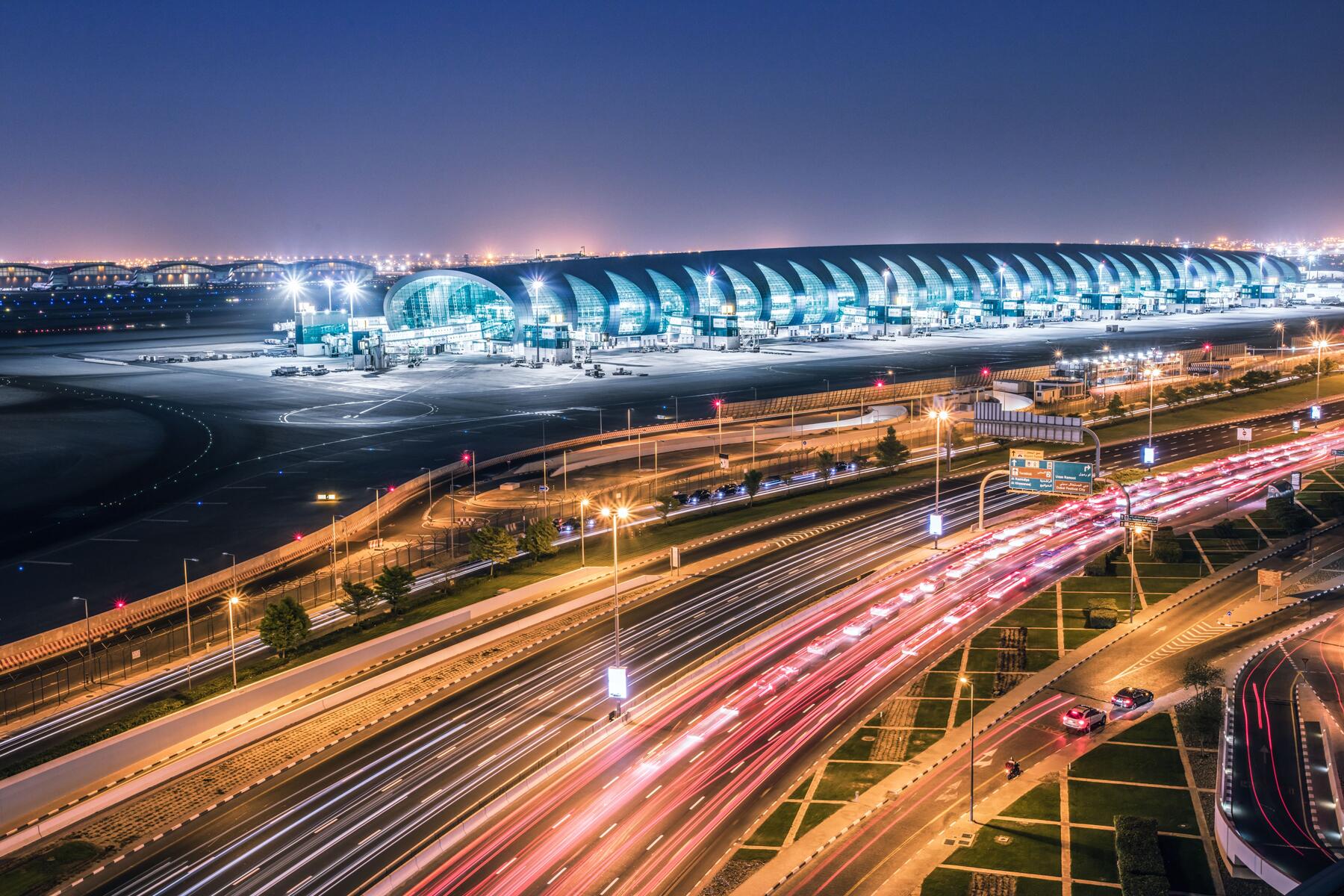Claire Baranowski
For many people, just the phrase "going on safari" is thrilling and evocative. It speaks of an adventure to be undertaken both far from home and comfort zone. It is an eagerly anticipated, once-in-a-lifetime trip. Sometimes, too, this first trip is the start of a long love affair with Africa, involving many repeat visits.
One thing is clear— first-time visitors want their trip to be unforgettable for all the right reasons. When it comes to booking and planning, it can be hard to know where to start. And to be fair, the possibilities are literally endless; not only within budget, but within each country and each individual or groups’ personal preferences. To get started, there are a few general types of safari, and picking the type that suits you is the best jumping off point.

What Type of Safari?
The all-out luxury. You’ll stay in a small, intimate camp, and the surroundings will be elegant and spacious. You’ll have access to all modern comforts including WiFi, the service will be impeccable, and meals gourmet, even miles from civilization. Often you’ll have your own private plunge pool, too, and access to a gym and a spa. Also on the luxury end of the market is the deliberately old-fashioned safari experience, where you’ll get the chance to feel like Ernest Hemingway (even if the only shooting you’ll be doing is with your camera). On this type of safari, you won’t be roughing it, but you’ll be surrounded by old-fashioned touches, like antique furniture and rugs, clawfoot bathtubs, and classical music played on a gramophone as you dine by candlelight. Unsurprisingly, this indulgence comes at a cost.
Recommended Fodor’s Video
The adventurous and active. For the adventurous and physically fit, walking safaris are a great way to explore natural trails made by animals that vehicles can’t get near. You’ll be accompanied by an expert guide, who will ensure that the enjoyable frisson of danger you experience doesn’t actually translate into a dangerous situation. Some safaris combine walking with the more traditional viewing from a vehicle. Accommodation can be DIY and basic, involving tents or campsites, or luxurious, where a back-up crew sets up everything for you each night. Other adventurous options include boat or canoe trips, safaris with Masai warriors, or journeying by horse or camel.
The specialized. You can also choose a safari that focuses on one particular animal (elephant, crocodile, chimpanzee, leopard, rhino) or cultural experience—hanging out with the Masai in Kenya or Tanzania, for example, or a nomadic tribe in Namibia. Some focus on an eco-friendly set up or offer volunteering opportunities. If you’re a keen photographer, you can travel with an expert and participate in on-location workshops. Lastly, if you’re traveling with kids you might want to pick lodges that have activities that will keep them entertained too.

Where to Go?
The classic destination is Kenya; here, as well as in Tanzania, you can witness the Great Migration. This annual journey of more than 2 million animals through the two countries is considered to be one of the world’s greatest wonders. South Africa is the continent’s most developed country, and offers world-class game viewing as well as side trips to Cape Town and wine regions. Botswana is expensive and less accessible, but has diverse terrain fewer visitors. Namibia is not the first country you may think of, but you can travel through the spectacular Namib desert as well as view game.
Alongside these more popular destinations, you can tack on visits to Victoria Falls, one of the natural wonders of the world, in Zambia, or the Seychelles for natural habitats and pristine beaches. The truly adventurous (or those hankering for a follow-up safari) should look at visiting Rwanda, Mozambique, Zambia, The Congo, or Uganda.

When to Go?
The high season is June to September, which is winter in Africa (with the exception of South Africa, where the high season is in December and January, in summer). Days are sunny and warm, but nights can get cold. The landscape is dry and barren, but this means animals are easier to spot and more likely to congregate at water holes. That said, this is also the most expensive time to visit.
The low season (or summertime in Africa) has its advantages: less visitors, lodge prices are heavily discounted (sometimes by up to half price), the landscape is lush and green, and there are lots of baby animals and birds. The low season is also the rainy season, but rains can be intermittent and fairly easy to work around. It can also get very hot and humid. A good compromise would be the shoulder season— autumn in the Northern hemisphere (September through November). The rains are only just beginning, visitor numbers are low, and lodges will be cheaper.

What to Budget, and What’s Included?
How much does a safari cost? Probably more than you want to spend! As a general guideline, a two weeks safari, including accommodation at good lodges, a beach escape at the end (a very common add-on), and international and local flights, will cost you from around $3000–$4000 to $15,000.
The good thing about safaris in a higher price range is that, usually, everything is included—all meals, game drives, laundry, accommodation, and transfers; you’ll only have to budget extra for tips and personal items.
There are ways of making your trip more affordable, though. In South Africa, you can drive yourself around and stay at a basic National Parks chalet with communal facilities. Another option is to stay at a hotel outside the park. In both instances you can hire a park ranger for the day to guide you to the wildlife. When booking your trip, however, always beware of what may seem like a bargain price—be sure to double check what’s included. Things like game park fees, meals, bottled water, airport transfers, tips, and alcohol can quickly mount up if they’re not part of your base fee.
Other factors that can affect pricing include how many countries and areas you visit, and the time of year you travel. One option is to mix it up—vary your accommodations from rustic to luxe, or deliberately choose to stay at the sister lodge or hotel of the same hotel group, as they may offer discounts. It’s a good idea to give your safari operator your target budget from the outset. They can discuss with you how realistic it is and together you can iron out an unforgettable itinerary.

DIY vs. Safari Operator?
Don’t presume that you’ll get a better deal if you book everything on your own; very often you won’t. For starters, as we’ve just touched on, there are literally hundreds of itineraries to choose from, and it can be very time consuming to research them all yourself. There’s also the hassle—communications and infrastructure in Africa can be poor, and if a flight is delayed, for example, it can derail your whole itinerary. Many lodges don’t accept bookings direct from the public, and in addition they often will offer special rates to safari operators.
By and large, the destinations you’ll visit will be perfectly safe. However, another reason to book with an operator is they will have on the ground knowledge of local conditions, both politically and climate-wise; if necessary they will make alternative arrangements for you.
More Insider Tips, Please
Try to pick an ethical safari operator, or one that doesn’t just give lip service when it comes to giving back to the community. Much of Africa is desperately poor; make sure your presence enhances the lives of local people and helps to conserve the environment.
Question your safari operator about the accommodations they are booking for you. Small, intimate lodges are expensive but at the same time, big and impersonal ones can feel like you’re staying in a chain hotel in the bush. Additionally, be aware that many flight transfers are in very small planes; if you don’t like the prospect of this you’ll have to go for land-only travel, which is more time-consuming as roads are bad.
Consider adding a few days at the beach to your trip. It’s a great way to unwind before you tackle the flight home. Kenya, Tanzania, and South Africa are great destinations for this.
Inform yourself on local customs and tipping guidelines. You don’t want to offend your hosts inadvertently, and many staff members earn the bulk of their income through tips.
Get comprehensive travel insurance. Going on safari in Africa is not dangerous in itself, but if you have a medical emergency you will want to make sure you are very well covered.
Photo Credits: Luxury Safari Lodge via Shutterstock Where to Go: Agap13 | Dreamstime.com; When to Go: Dave Pusey/Shutterstock; What to Budget: safari lodge via Shutterstock; DIY vs. Operator: Brian Raisbeck/iStockphoto


